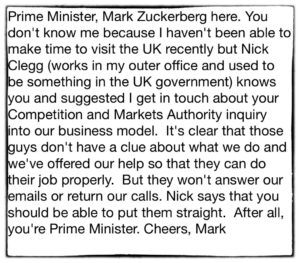Quote of the Day
”When I want a peerage, I shall buy one like an honest man.”
- Lord Northcliffe
Musical alternative to the morning’s radio news
Beethoven | Piano Sonata No.30 in E, Op.109 | Andante | Mitsuko Uchida
Ravishing.
Long Read of the Day
Why Animals Don’t Get Lost
Riveting and informative New Yorker essay by Kathryn Schulz. It opens with a preposterous story that couldn’t possibly be true — but is. After that you’re hooked.
Covid and inequality
From the Council on Foreign Relations.
In a nutshell…
Beyond revealing inequalities and devastating public health, the pandemic has had two dangerous effects in all of these countries: COVID-19 actually has made socioeconomic inequality worse, possibly for years to come, and has significantly exacerbated democratic regression. In these five states, caseloads and death tolls of the novel coronavirus are falling hardest on racial, ethnic, and sometimes religious minorities and on the poor; poor and minority communities significantly overlap, and many of these same citizens have the preexisting conditions that make them more susceptible to getting extremely sick or dying from COVID-19. The pandemic seems to be further entrenching economic and social inequalities, and some leaders are passing pandemic-era measures that could further hurt poor and minority groups. Furthermore, as often has happened during past major emergencies, political leaders have taken advantage of the emergency to corrode democratic norms and institutions—in these five democracies and across the globe.
Policy-making by WhatsApp
From the Financial Times (behind a paywall):
Lex Greensill pressed Australian prime minister Scott Morrison to introduce a lending scheme for government workers in a lobbying effort that included a misdirected WhatsApp message citing David Cameron.
In the October 2019 message, intended for Morrison but sent by mistake to a different number, the financier played on his association with the former British prime minister: “David Cameron, who is on our board and a material shareholder, speaks most highly of you,” Greensill wrote.
In reality, Cameron was a paid adviser rather than a board member and was not a material shareholder, although he is believed to have options that could have entitled him to about 1 per cent of Greensill Capital. At one stage, these were thought to be worth tens of millions of pounds but since Greensill Capital’s collapse last month are now worthless.
Reading it, I began to fantasise about interesting misdirected messages that might crop up on my WhatsApp. Something like this for example, originally intended for Boris Johnson:
Clarity on the side-effects of the AstraZeneca jab
Useful piece in the Economist. It’s behind a paywall despite the fact that the magazine boasts that it’s making all its coverage of the Coronavirus available in a compendium site. Still..
Here’s the gist: it suggests that the clotting side-effect is similar to something that medicine already understands — an immune response to heparin, a widely-used drug.
The first signals emerged in late February, when doctors in several European countries noticed clusters of blood clots in people recently given the AstraZeneca jab, some of whom died. Most were women under 60, which was not terribly surprising because many EU countries were, at first, not convinced that the jab worked in the elderly and used it largely for essential workers, such as nurses, teachers and social-care workers—professions in which most employees are women.
The EMA’s data as of March 22nd suggested that the rate of brain clots in people under the age of 60 who had had AstraZeneca’s vaccine was one in 100,000—higher than would be expected normally. Precisely how much higher, though, is hard to tell. The rates of such rare and difficult-to-diagnose conditions vary a lot by country, age and sex. Estimates of the incidence of such brain clots have ranged from 0.22 to 1.57 cases per 100,000 people per year, and they are more common in younger people and women.
As doctors began to look more closely, something curious emerged. Many patients with suspected clots from the vaccine had unusually low levels of platelets. These are fragments of special precursor cells that float in the blood. Their job is to form blood clots (they rush to the site of a cut or other bleeding). Low platelet levels therefore usually result in uncontrolled bleeding, not clots.
With this new information to hand, Britain’s medical regulators searched their data on vaccinated people for the unusual tandem of clots and low platelet counts. They found four cases per million people vaccinated, a rate several times lower than in the EU. One explanation is that Britain, unlike the rest of Europe, had used the jab primarily in older people. The rate at which the clots occurred in Britain declined steadily with age. Importantly, Britain’s experts found that the clots occurred as much in men as they did in women.
This combination of blood clots and low platelet counts is something that doctors know how to diagnose and treat, says Jean Marie Connors, a haematologist at Brigham and Women’s Hospital, in Boston. It resembles a condition seen in some people who are given heparin, a drug used widely to treat blood clots. For unknown reasons, some people develop an immune reaction to heparin, which results in blood clotting so profound that it depletes their platelets. The same reaction appears to be provoked by the vaccine.
Medical societies in several countries have already issued guidelines to doctors on how to spot and treat this rare reaction to the AstraZeneca vaccine. With vigilance and appropriate care, the extremely rare deaths that may result from it will become even rarer.
This blog is also available as a daily email. If you think this might suit you better, why not subscribe? One email a day, delivered to your inbox at 7am UK time. It’s free, and there’s a one-click unsubscribe if you decide that your inbox is full enough already!



